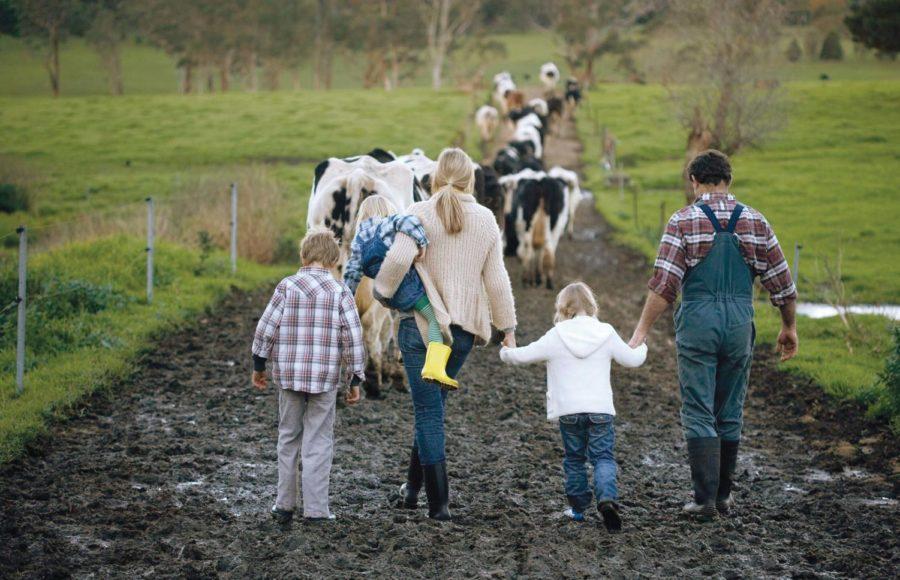Cline: New bill would kill family farm
Family with three children (3-9) walking on muddy road, cows in background, rear view
January 20, 2012
There is no place like a farm to learn hard work. Anyone who has spent even one summer working for a farm enterprise can attest to the work ethic required to maintain a level of success. Even in this era of technological advancement and mechanization, it is a sun-up-to-sun-down occupation.
Recently, new legislation has been placed on the table that could hurt progress of the American farm industry. Proposed by the Department of Labor, the new bill would greatly limit the daily chores done by workers under the age of 18 and almost eliminate work done by children under the age of 16.
Farming success is based on the work of the family. On many farms, kids are brought into the barn as soon as they are able to walk. It’s a learning process. Kids begin with the simplest of tasks and as they grow up, they observe and are taught new chores. No one is putting a 7-year-old in a combine and expecting him to harvest a crop alone. Care for all individuals, animals, tools and products are a top priority.
Our society is moving away from the farm, while fewer and fewer people are aware of where their food comes from. This bill would perpetuate that disconnect and keep kids away from skills and knowledge they would otherwise gain from the diligent work. Just a few generations ago, a far greater segment of our population was directly engaged in agriculture, and farm children knew where their food came from, how to get it and the best way to care for it during its growth.
By legally depriving future generations of this exposure, we are taking away all of the advantages that come with growing up in the ag industry. Many of the new proposals are being viewed as “safeguards” for farm youth. One of the most interesting propositions lists “prohibition of youths at country grain elevators, grain bins, silos, feed lots, stockyards, livestock exchanges and livestock auctions.” This would essentially eliminate participation of teenagers in the harvest and storage of crops, as well as sale and purchase of animals. Many of these are intensive or time-consuming procedures that cannot be done by a parent or grandparent alone. If we take away the help of the family, farmers will have to look elsewhere for labor, thus, an added expense.
Another bit of the legislation states “prohibition of those under 16 years old from operating almost all power-driven equipment,” according to an article released by Delta Farm Press. A poll of ISU students who were raised on farms would surely indicate that a vast majority had operated a tractor, skid loader or other implement by the time they were 16.
Perhaps the most astounding suggestion reads “… working with animals to pesticide handling, timber operations, grain bins and complex, power-driven equipment. These are activities best left to trained adults.” It is almost possible to sense the collective eye-popping and jaw-dropping taking place from anyone who was raised around agriculture. These jobs come with some element of danger, but children raised around livestock or grain harvesting are taught proper safety from day one. Because an adult is properly trained does not mean they are completely absolved from danger in any industry.
Other sections of the Department of Labor’s proposal are aimed at corporate farms or business partnership farms, not necessarily the classic Midwest family farm. However, modern farms are taking on a more formal business structure, such as becoming limited liability companies. This would mean that a family farm that may only have 50 milk cows would be viewed the same as a multi-thousand cow setup, in the eyes of the law. Despite the clear disparity of the size and labor requirements, it would make no difference and children would be denied the opportunity to help the family.
Life on a farm is an incomparable experience. Mom, dad, son, daughter all working together to achieve a goal; it’s an everyday obligation that strengthens a bond rarely seen elsewhere. It is the older kids teaching the younger kids and neighbor helping neighbor. Farmers are more than willing to help each other in times of struggle. If a farmer were to need time off, he could often rely on the neighbors and their families to pitch in. Those days would be history.
This neighborly kindness spreads to others in the community. County 4-H programs have long been built on the sharing of knowledge. Families that do not raise their own crops or animals rely on friends and community members to provide educational opportunities, should their children want to be engaged in agriculture. With a ban on youth participating with animals or working around a farm, they would not be able to exhibit what they have learned and accomplished.
If this new bill were to pass, it would hurt American farm youth, not protect it. We would be taking away an intricate part of our past and destroy our future. Thankfully, Sen. Charles Grassley, R-Iowa, has been working as a part of a coalition to alter the stipulations. Alteration, if not eradication, of this bill is necessary to maintain the integrity and work ethic instilled on youth in the farming community.







